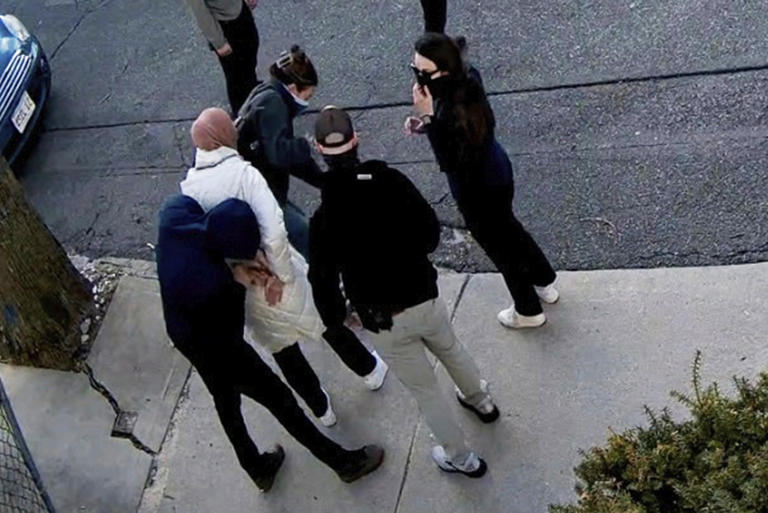
A Turkish graduate student detained outside her apartment by masked ICE agents last month was not told why she was being arrested and feared she was being abducted as she was transferred between cars and moved out of Massachusetts, a court document says.
Rumeysa Ozturk, a 30-year-old doctoral student at Tufts University, did not know that the State Department had revoked her visa when she was apprehended on March 25 near Boston.
Ozturk was on the phone with her mother when several men surrounded her on the sidewalk and she screamed, Ozturk wrote in a sworn declaration submitted in her case. One flashed a badge but too quickly for Ozturk to see what it said.
“I didn’t think that they were the police because I had never seen police approach and take someone away like this,” Ozturk wrote. “I thought this was a strange situation and was sure they were going to kill me.”
Ozturk’s lawyers say she was targeted for co-authoring an op-ed last year in a student newspaper criticizing the university’s response to the Israel-Gaza war.
The Department of Homeland Security has said Ozturk engaged in activities “in support of Hamas” but neither the agency nor prosecutors have provided evidence for that claim.
A hearing in Ozturk’s case is scheduled for Monday in federal court in Vermont.
The revocation of Ozturk’s visa is part of a sweeping crackdown on international students and scholars by the Trump administration. Nearly 1,000 have had their records terminated in a federal database.
Some of the visa revocations and terminations appear connected to criminal records checks while others target students for their involvement in pro-Palestinian activism or demonstrations. Ozturk was not a leader in last year’s protests at Tufts and her arrest has drawn widespread condemnation, including from a pro-Israel group on campus and Tufts Republicans.
In February, a profile identifying Ozturk appeared on Canary Mission, a website that says it features people who “promote hatred of the USA, Israel and Jews” on North American college campuses and beyond.
On March 25, Ozturk was handcuffed, then chained at the waist and put in ankle shackles, she wrote, as plainclothes officers switched her between vehicles. Her repeated requests to speak to her attorney were rebuffed.
Ozturk, who had been on her way to break her fast during Ramadan, told agents she needed to have a meal. They gave her two packages of crackers and a bottle of water, which she was initially too afraid to eat, fearing it could be poisoned.
Later that evening, the agents stopped at what appeared to be a police station in New Hampshire, Ozturk wrote, the first time she believed she was being held by law enforcement officials rather than potential kidnappers.
Ozturk was taken first to New Hampshire and later to Vermont. It was not until she arrived in Vermont that she received paperwork related to her arrest — a “notice to appear” in an immigration proceeding due to the revocation of her visa.
Early on March 26, she was flown to Louisiana, where she remains in an ICE detention facility. Ozturk suffers from asthma and carries an emergency inhaler. She has had four asthma attacks since her arrest, episodes that leave her feeling “short of breath, afraid, anxious and physically exhausted,” she wrote.
Ozturk said she is being held in a group cell whose stated capacity is 14 but currently holds 24 women. She described the conditions as “very unsanitary, unsafe, and inhumane.” She has not been provided a prayer rug or a Quran or met with a Muslim chaplain, despite her requests.
Ozturk said she prays every day that she will be able to go her home and community to complete her doctorate in Child Study and Human Development, which she is less than a year away from completing.
“I want to return to Tufts to resume all my cherished work,” Ozturk wrote.



